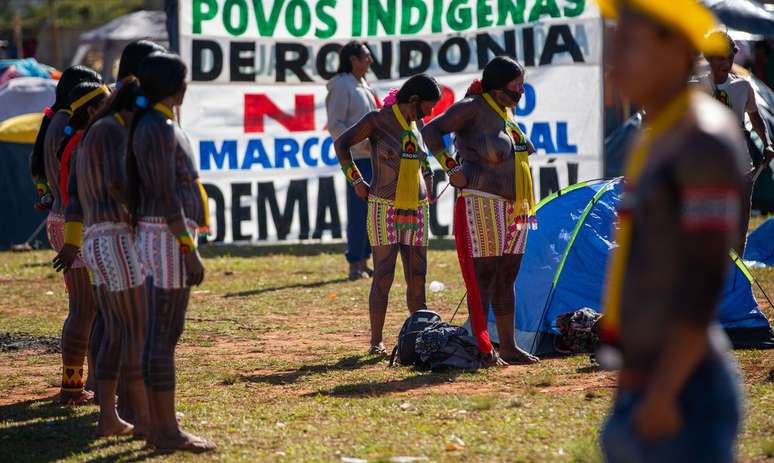The session can also be accompanied by a screen on the side of the Supreme
This Wednesday (7), 50 seats were reserved in the plenary session of the Supreme Federal Court (STF) for indigenous people to participate in the debates on the timing for the delimitation of territories in the country. The session is scheduled to start at 2.00pm.
A screen will also be mounted on the side of the Supreme, where 250 indigenous people will be able to stay. The authorization for the presence of the representatives of the indigenous peoples was given by Minister Rosa Weber, president of the Tribunal, who met some of these representatives in her office on Tuesday (6).
As on the other occasions in which the appeal on the matter was judged, hundreds of indigenous people came to Brasilia to follow the trial closely.
The case will be resumed with the vote of Minister Alexandre de Moraes, who has asked for a vision (more time for analysis) in 2021, when the trial began. Up to now the rapporteur Edson Fachin, against the thesis of the times, and the minister Nunes Marques, in favor of the thesis, have voted.
Dispute
The controversy is related to the 2009 ruling, in which the Supreme Court ruled in favor of the delimitation of the Raposa Terra do Sol Indigenous Land, Roraima. At the time, part of the favorable understanding of the measure was that indigenous peoples occupied the area when the Constitution was promulgated on October 5, 1988.
Since then, this agreement has given rise to dozens of legal actions against the delimitation of indigenous lands. Based on this thesis, some rural landowners obtained favorable decisions in the first instances of justice.
The case that reached the plenary of the Supreme Court is an appeal against the decision of the Federal Regional Court of the 4th Region (TRF4) which, taking advantage of the lapse of time, agreed with the State of Santa Catarina in the dispute with the Xokleng for the possession of the land indigenous Ibirama.
The appeal discussing the issue has general repercussions, meaning that the outcome of the judgment will serve as a yardstick for analyzing the legitimacy of all indigenous land demarcations in the country.
subjects
The debate is opposed by indigenous peoples and agribusiness representative entities, who argue that it is necessary, in the name of legal certainty, to establish that only lands occupied by indigenous peoples on the date of entry into force of the 1988 Constitution can be demarcated .
From this point of view, the argument is that the landowners who occupied and produced their lands before 1988 could not be forced to leave only on the basis of evidence of the existence of indigenous peoples in the area in distant times. This would put much of the country’s productive land at risk of expropriation, say representatives of various agricultural sectors.
On behalf of the Brazilian Confederation of Agriculture and Livestock (CNA), the lawyer Rudy Ferraz said that the time frame is “an important conciliation tool” for the resolution of agrarian conflicts.
“We cannot live in total insecurity, with the possibility that any title, in 10 or 20 years, will be canceled because someone in the past said that there was a possibility of having indigenous land there,” added the defender, in support oral, at the beginning of the trial.
On the other hand, organizations such as Articulação dos Povos Indígenas do Brasil (Apib) argue that the Constitution does not mention a time frame and that the thesis ignores hundreds of years of dispossession and persecution of indigenous peoples.
“Imposing us the burden of occupying our lands on October 5, 1988 is ignoring this very recent past, in which we didn’t even have the right to define our destinations,” said lawyer Samara Pataxó, legal coordinator of Apib.
In all, representatives of 21 pro-indigenous entities and 13 pro-rural producers spoke at the trial. The Attorney General of the Republic, Augusto Aras, has taken a stand against the times, underlining that the original rights of indigenous peoples already existed in laws and regulations prior to the 1988 Constitution.
Congratulations
In his vote, Minister Edson Fachin affirmed that the original rights of indigenous peoples are fundamental, therefore they have the status of an iron clause in the Constitution, and cannot be modified or relativized. He added that these rights already existed before the 1988 Charter.
“The date of entry into force of the 1988 Constitution does not constitute a time frame for the measurement of indigenous possession rights, under penalty of disregarding these rights as fundamental, as well as the entire normative-constitutional framework for the protection over time of possession indigenous” , said the speaker.
Minister Nunes Marques has opened a difference. For him, national sovereignty could be at risk if a time frame is not established, given the possibility of an “unlimited expansion” of the areas subject to claims by indigenous peoples.
“Subsequent possessions [a 5 de outubro de 1988] they cannot be considered traditional, because they would imply not only the recognition of indigenous peoples to their lands, but also the right to extend them indefinitely to other areas already incorporated in the national real estate market,” Marques said.
I count
In parallel with the discussion in the Supreme Court, the Chamber of Deputies approved a 2007 bill which sets the timeline. Processing of PL 490/2007 was accelerated after Rosa Weber, president of the Supreme Court, scheduled the resumption of the trial on the matter. The minister made the announcement in April.
The PL for the Time Framework was passed urgently in the House last week and forwarded to the Senate. The president of the Senate, Rodrigo Pacheco (PSD-MG), has already declared, however, that the issue will not be treated as an emergency in the Chamber, and should follow the normal procedure for discussion in the thematic commissions.
As a result, there is the possibility that the project will end up in limbo if the Supreme Court finds that the idea of a time frame for the delimitation of indigenous lands violates an iron clause of the Constitution.
Edition: Adjutant Grace
Source: Terra
Rose James is a Gossipify movie and series reviewer known for her in-depth analysis and unique perspective on the latest releases. With a background in film studies, she provides engaging and informative reviews, and keeps readers up to date with industry trends and emerging talents.







